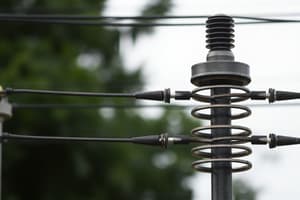Podcast
Questions and Answers
Electrical ______ can transmit the flow of energy.
Electrical ______ can transmit the flow of energy.
Conductors
A substance with low pH is considered to be ______.
A substance with low pH is considered to be ______.
acidic
Ductility is the ability of a material to be stretched and converted into ______.
Ductility is the ability of a material to be stretched and converted into ______.
thin wires
The ______ point of a substance is the temperature at which it changes from liquid to gas.
The ______ point of a substance is the temperature at which it changes from liquid to gas.
______ occurs when a material is gradually destroyed by a chemical reaction.
______ occurs when a material is gradually destroyed by a chemical reaction.
Materials that prevent the flow of energy are known as ______.
Materials that prevent the flow of energy are known as ______.
Elasticity is the tendency of a material to return to its original ______ after being stretched.
Elasticity is the tendency of a material to return to its original ______ after being stretched.
Solubility describes the ability of a substance to be ______ in a solvent.
Solubility describes the ability of a substance to be ______ in a solvent.
Elasticity is the tendency of a material to return to its original form after being ______.
Elasticity is the tendency of a material to return to its original form after being ______.
Corrosiveness leads to gradual destruction by a chemical reaction, often involving strong ______.
Corrosiveness leads to gradual destruction by a chemical reaction, often involving strong ______.
A physical property is measured without changing a substance's chemical ______.
A physical property is measured without changing a substance's chemical ______.
An intensive property is independent of the amount of a ______.
An intensive property is independent of the amount of a ______.
An extensive property is dependent on the amount of a ______.
An extensive property is dependent on the amount of a ______.
Chemical properties are measured only by changing a substance's ______.
Chemical properties are measured only by changing a substance's ______.
The classification of properties of matter includes both ______ and physical properties.
The classification of properties of matter includes both ______ and physical properties.
The distinction between intensive and extensive properties is based on their dependency on the amount of ______.
The distinction between intensive and extensive properties is based on their dependency on the amount of ______.
Flashcards are hidden until you start studying
Study Notes
Properties of Matter
Electrical Properties
- Electrical Conductors: Materials that efficiently transmit energy due to freely moving electrons, facilitating quick thermal energy transfer.
- Electrical Insulators: Materials that restrict energy flow by preventing electron movement.
Density
- Determined by temperature and pressure; measured at 0°C and 1 atmosphere.
- Higher density occurs in substances with smaller, heavier atoms packed closely together.
Acidity and Basicity
- Acidity: Characterized by higher concentrations of hydrogen ions (low pH) in acidic solutions.
- Basicity: Defined by lower concentrations of hydroxide ions (high pH) in basic solutions.
Flammability
- Depends on the chemical composition; a higher carbon content typically increases flammability.
Reactivity
- Reflects a substance's potential to undergo chemical reactions and release energy.
- Reactive substances can be hazardous under conditions of heat, pressure, shock, or contact with air or water.
Malleability and Ductility
- Malleability: The ability to be shaped into thin sheets without breaking.
- Ductility: The ability to stretch into thin wires under stress.
Solubility
- The capacity of a substance (solute) to dissolve in another substance (solvent).
Boiling and Melting Points
- Boiling Point: The temperature at which a liquid transitions into a gas.
- Melting Point: The temperature at which a solid transitions into a liquid.
Polarity
- Refers to how atoms bond covalently, impacting solubility, boiling/melting points, and intermolecular attraction.
Elasticity
- The tendency of a material to return to its original shape after deformation.
Corrosiveness
- The gradual destructive effect of chemical reactions, often caused by strong acids, oxidizers, and bases.
Types of Properties
-
Physical Properties: Measured without altering a substance's chemical identity; further divided into:
- Intensive Properties: Independent of the amount of substance (e.g., density, boiling point).
- Extensive Properties: Dependent on the amount of substance (e.g., mass, volume).
-
Chemical Properties: Only determined by changing the substance's identity through chemical reactions.
Studying That Suits You
Use AI to generate personalized quizzes and flashcards to suit your learning preferences.




